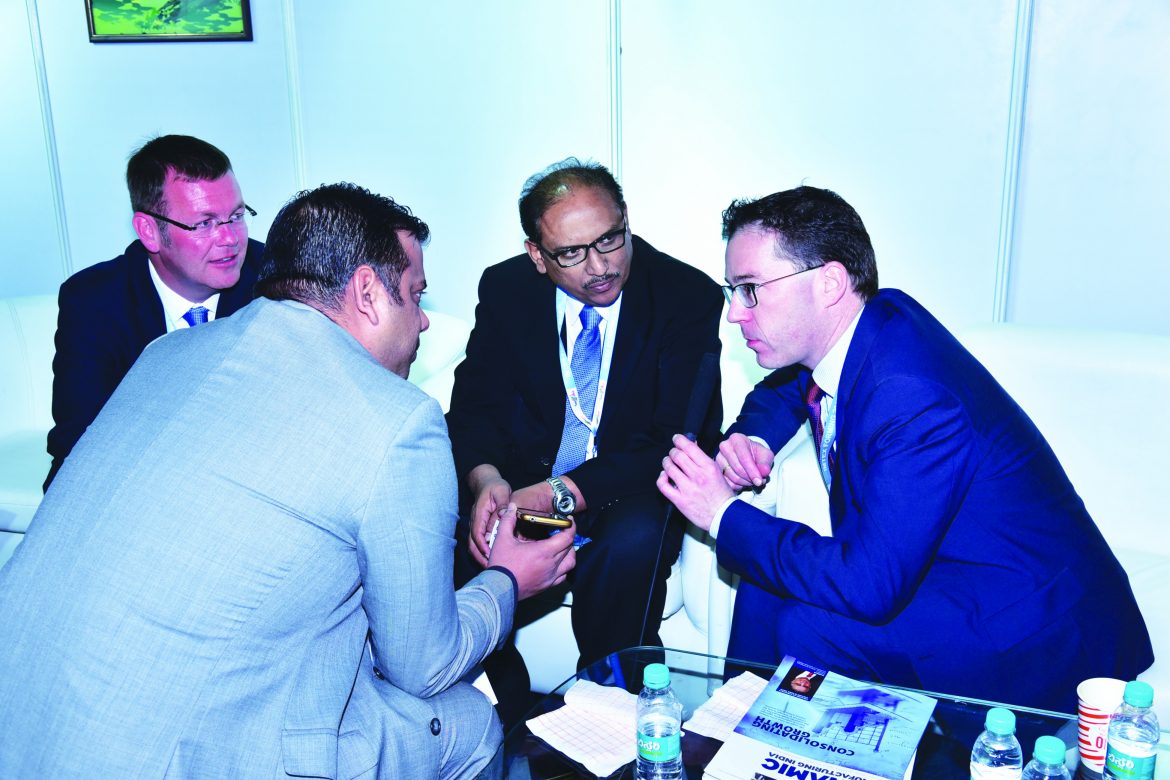We will continue adding talent to our India R&D centre
DMI met the India and global leadership team of ZEISS, the optics and optoelectronics technology leader at IMTEX 2018 held during the last week of January in Bengaluru. We spoke to Dr Jochen Peter, President and CEO, Industrial Metrology Business Group,
Carl Zeiss Industrielle Messtechnik GMBH, ZEISS Group of Companies; Daniel Sims, MD, Carl Zeiss India, and Wilson Thomas, COO and Director, Carl Zeiss India about visitor response at IMTEX and their India plans. Excerpts..
What are the major challenges that India is facing in order to achieve its true potential in the manufacturing sector?
Daniel Sims: I don’t see and major hurdles or obstacles in the sector. Currently, our customers (in India) are investing, developing world class manufacturing capabilities and delivering products to customers across the globe. We produce Coordinate Measuring Machines (CMMs) as well as spectacle lenses in India. The same activity is replicated in our worldwide facilities that have the same footprint, configuration, and specifications. The products are then exported from these facilities to our global customers. It doesn’t matter if you buy your glasses in Germany, Singapore, Bengaluru, Johannesburg or Dubai – we ensure that we meet the Carl Zeiss quality standard so the manufacturing location does not matter. If Indian manufacturers can ensure consistency in their manufacturing process in terms of quality, speed and cost effectiveness then there is nothing standing in the way of Indian manufacturers.
It is purely a matter of focus and strategic choice of how one is going to build their manufacturing capability. In a global market like India where global products are available, Indian companies need to compete in the domestic market from a global level. There is a massive opportunity for Indian companies to compete in the export market.
What should be the chief objective of Mission Make in India – should it be creation of jobs or achieving global manufacturing excellence or both?
Dr Jochen Peter: I am not an India expert. Said that, I think that any Indian company should strive to be competitive from a global perspective because it is the globally successful companies that create jobs. Therefore I think if companies strive to become globally competitive, job creation is an automatic result.
In your opinion, will Industry 4.0 provide a boost to the Indian manufacturing industry?
Wilson Thomas: Absolutely, Industry 4.0 is a concept that is driven by Germany and provides a futuristic solution. I have seen many people talking about Industry 4.0; this is going to be absorbed quickly into the manufacturing sector – I am [pleasantly] surprised that even pharma companies are talking about Industry 4.0. We displayed solutions of Industry 4.0 at our booth in IMTEX and the response was fantastic.
What are the new initiatives which Carl Zeiss will be undertaking in 2018 in India as well as globally?
Dr Jochen Peter: On the global stage we are very proud of our R&D investment which we will continue doing in 2018. I think this will also be very relevant for India because, as we mentioned, we have our software R&D centre here. We will keep on adding people here because as we said it’s a part of our innovation network. Therefore some of these investments into R&D will also flow into India.
Presently, there is much buzz globally around electric vehicles. Since automotive is one of your major markets, what scope do you see for electric vehicles in India right now and in the coming 10 years?
Wilson Thomas: I do not see a big change in the next one-two years. It is not only that one should possess a good electric car but one also should also have the infrastructure to charge the vehicle. Therefore I do not think that switching to electric is a brilliant idea – although it can happen in phases by means of hybrid cars. A day will come when we have to catch up with the rest of the world but I think we still have some time to go before it happens.
How will the ‘Make in India’ initiative assist in creating jobs in the Indian market?
Wilson Thomas: Any company should strive to be competitive at a global level because once they achieve the competitiveness on a global scale, they will be successful and successful companies create jobs. Therefore, if the ‘Make in India’ initiative strives to become globally competitive, job creation will be an automatic result.
How has been the response here at IMTEX?
Wilson Thomas: So far the show has been very positive. The new technologies that we have shown have been given a thumbs-up by most of the customers that we have interacted. This is a forming show; obviously we don’t expect the kind of response that we would see in a metal cutting show. But the kind of response we got for car body solution has been very good.
How do you see the future of 3D printing technology in India?
Wilson Thomas: 3D printing is catching up very fast globally as well as here. If I look at academics, I can say most engineering and polytechnic colleges have 3D printing facilities. Of course they are doing plastics, but that is a glimpse of some serious work happening in the industry with metal printing. Right now the technology itself is very nascent – it has its own issues. But the day is not far away when you will have good 3D printing components to be used for all applications – for example rotary parts going into aircraft engine and so on. The technology for non-critical parts is readily available. This is one segment that will be very fast developing in India – India has a big potential for 3D printing.


